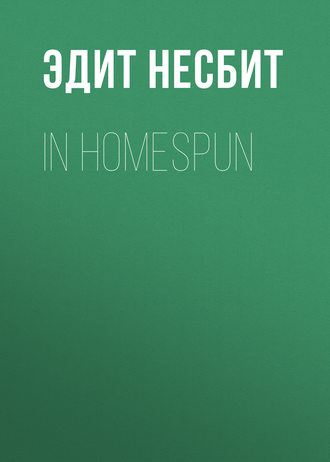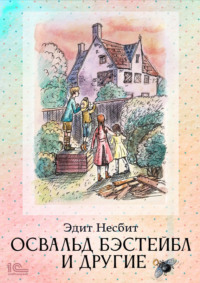 полная версия
полная версияIn Homespun

E. Nesbit
In Homespun
THE BRISTOL BOWL
MY cousin Sarah and me had only one aunt between us, and that was my Aunt Maria, who lived in the little cottage up by the church.
Now my aunt had a tidy little bit of money laid by, which she couldn't in reason expect to carry with her when her time came to go, wherever it was she might go to, and a houseful of furniture, old-fashioned, but strong and good still. So of course Sarah and I were not behindhand in going up to see the old lady, and taking her a pot or so of jam in fruiting season, or a turnover, maybe, on a baking-day, if the oven had been steady and the baking turned out well. And you couldn't have told from aunt's manner which of us she liked best; and there were some folks who thought she might leave half to me and half to Sarah, for she hadn't chick nor child of her own.
But aunt was of a having nature, and what she had once got together she couldn't bear to see scattered. Even if it was only what she had got in her rag-bag, she would give it to one person to make a big quilt of, rather than give it to two persons to make two little quilts.
So Sarah and me, we knew that the money might come to either or neither of us, but go to both it wouldn't.
Now, some people don't believe in special mercies, but I have always thought there must have been something out of the common way for things to happen as they did the day Aunt Maria sprained her ankle. She sent over to the farm where we were living with my mother (who was a sensible woman, and carried on the farm much better than most men would have done, though that's neither here nor there) to ask if Sarah or me could be spared to go and look after her a bit, for the doctor said she couldn't put her foot to the ground for a week or more.
Now, the minister I sit under always warns us against superstition, which, I take it, means believing more than you have any occasion to. And I'm not more given to it than most folks, but still I always have said, and I always shall say, that there's a special Providence above us, and it wasn't for nothing that Sarah was laid up with a quinsy that very morning. So I put a few things together—in Sarah's hat-tin, I remember, which was handier to carry than my own—and I went up to the cottage.
Aunt was in bed, and whether it was the sprained ankle or the hot weather I don't know, but the old lady was cantankerous past all believing.
'Good-morning, aunt,' I said, when I went in, 'and however did this happen?'
'Oh, you've come, have you?' she said, without answering my question, 'and brought enough luggage to last you a year, I'll be bound. When I was young, a girl could go to spend a week without nonsense of boxes or the like. A clean shift and a change of stockings done up in a cotton handkerchief—that was good enough for us. But now, you girls must all be young ladies. I've no patience with you.'
I didn't answer back, for answering back is a poor sort of business when the other person is able to make you pay for every idle word. Of course, it's different if you haven't anything to lose by it. So I just said—
'Never mind, aunt dear. I really haven't brought much; and what would you like me to do first?'
'I should think you'd see for yourself,' says she, thumping her pillows, 'that there's not a stick in the house been dusted yet—no, nor a stair swep'.'
So I set to to clean the house, which was cleaner than most people's already, and I got a nice bit of dinner and took it up on a tray. But no, that wasn't right, for I'd put the best instead of the second-best cloth on the tray.
'The workhouse is where you'll end,' says aunt.
But she ate up all the dinner, and after that she seemed to get a little easier in her temper, and by-and-by fell off to sleep.
I finished the stairs and tidied up the kitchen, and then I went to dust the parlour.
Now, my aunt's parlour was a perfect moral. I have never seen its like before or since. The mantelpiece and the corner cupboard, and the shelves behind the door, and the top of the chest of drawers and the bureau were all covered up with a perfect litter and lurry of old china. Not sets of anything, but different basins and jugs and cups and plates and china spoons and the bust of John Wesley and Elijah feeding the ravens in a red gown and standing on a green crockery grass plot.
There was every kind of china uselessness that you could think of; and Sarah and I used to think it hard that a girl had no chance of getting on in life without she dusted all this rubbish once a week at the least.
'Well, the sooner begun the sooner ended,' says I to myself So I took the silk handkerchief that aunt kep' a purpose—an old one it was that had belonged to uncle, and hemmed with aunt's own hair and marked with his name in the corner. (Folks must have had a deal of time in those days, I often think.) And I began to dust the things, beginning with the big bowl on the chest of drawers, for aunt always would have everything done just one way and no other.
You think, perhaps, that I might as well have sat down in the arm-chair and had a quiet nap and told aunt afterwards that I had dusted everything; but you must know she was quite equivalent to asking any of the neighbours who might drop in whether that dratted china of hers was dusted properly.
It was a hot afternoon, and I was tired and a bit cross.
'Aunts, and uncles, and grandmothers,' thinks I to myself. 'O what a stupid old lot they must have been to have set such store by all this gimcrackery! Oh, if only a bull or something could get in here for five minutes and smash every precious—oh, my cats alive!'
I don't know how I did it, but just as I was saying that about the bull, the big bowl slipped from my hands and broke in three pieces on the floor at my feet, and at the same moment I heard aunt thump, thump, thumping with the heel of her boot on the floor for me to go up and tell her what I had broken. I tell you I wished from my heart at that moment that it was me that had had the quinsy instead of Sarah.
I was so knocked all of a heap that I couldn't move, and the boot went on thump, thump, thumping overhead. I had to go, but I was flustered to that degree that as I went up the stairs I couldn't for the life of me think what I should say.
Aunt was sitting up in bed, and she shook her fist at me when I went in.
'Out with it!' she said. 'Speak the truth. Which of them is it? The yallar china dish, or the big teapot, or the Wedgwood tobaccojar that belonged to your grandfather?'
And then all in a minute I knew what to say. The words seemed to be put into my mouth, like they were into the prophets of old.
'Lord, aunt!' I said, 'you give me quite a turn, battering on the floor that way. What do you want? What is it?'
'What have you broken, you wicked, heartless girl? Out with it, quick!'
'Broken?' I says. 'Well, I hope you won't mind much, aunt, but I have had a misfortune with the little cracked pie-dish that the potatopie was baked in; but I can easy get you another down at Wilkins.'
Aunt fell back on her pillows with a sort of groan.
'Thank them as be!' she said, and then she sat up again, bolt upright all in a minute.
'You fetch me the pieces,' she says, short and sharp.
I hope it isn't boastful to say that I don't think many girls would have had the sense to bring up that dish in their apron and to break it on their knee as they came up the stairs, and take it in and show it to her.
'Don't say another word about it,' says my aunt, as kind and hearty as you please.
Things not being as bad as she expected, it made her quite willing to put up with things being a bit worse than they had been five minutes before. I've often noticed it is this way with people.
'You're a good girl, Jane,' she says, 'a very good girl, and I shan't forget it, my dear. Go on down, now, and make haste with your washing up, and get to work dusting the china.'
And it was such a weight off my mind to feel that she didn't know, that I felt as if everything was all right until I got downstairs and see those three pieces of that red and yellow and green and blue basin lying on the carpet as I had left them. My heart beat fit to knock me down, but I kept my wits about me, and I stuck it together with white of egg, and put it back in its place on the wool mat with the little teapot on top of it so that no one could have noticed that there was anything wrong with it unless they took the thing up in their hands.
The next three days I waited on aunt hand and foot, and did everything she asked, and she was as pleased as pleased, till I felt that Sarah hadn't a chance.
On the third day I told aunt that mother would want me, it being Saturday, and she was quite willing for the Widow Gladish to come in and do for her while I was away. I chose a Saturday because that and Sunday were the only days the china wasn't dusted.
I went home as quick as I could, and I told mother all about it.
'And don't you, for any sake, tell Sarah a word about it, or quinsy or no quinsy, she'll be up at aunt's before we know where we are, to let the cat out of the bag.'
I took all the money out of my money-box that I had saved up for starting housekeeping with in case aunt should leave her money to
Sarah, and I put it in my pocket, and I took the first train to London.
I asked the porter at the station to tell me the way to the best china-shop in London; and he told me there was one in Queen Victoria Street. So I went there.
It was a beautiful place, with velvet sofas for people to sit down on while they looked at the china and glass and chose which pattern they would have; and there were thousands of basins far more beautiful than aunt's, but not one like hers, and when I had looked over some fifty of them, the gentleman who was showing them to me said—
'Perhaps you could give me some idea of what it is you do want?'
Now, I had brought one of the pieces of the bowl up with me, the piece at the back where it didn't show, and I pulled it out and showed it to him.
'I want one like this,' I said.
'Oh!' said he, 'why didn't you say so at first? We don't keep that sort of thing here, and it's a chance if you get it at all. You might in Wardour Street, or at Mr. Aked's in Green Street, Leicester Square.'
Well, time was getting on and I did a thing I had never done before, though I had often read of it in the novelettes. I waved my umbrella and I got into a hansom cab.
'Young man,' I said, 'will you please drive to Mr. Aked's in Green Street, Leicester Square? and drive careful, young man, for I have a piece of china in my hands that's worth a fortune to me.'
So he grinned and I got in and the cab started. A hansom cab is better than any carriage you ever rode in, with soft cushions to lean against and little looking-glasses to look at yourself in, and, somehow, you don't hear the wheels. I leaned back and looked at myself and felt like a duchess, for I had my new hat and mantle on, and I knew I looked nice by the way the young men on the tops of the omnibuses looked at me and smiled. It was a lovely drive. When we got to Mr. Aked's, which looked to me more like a rag-and-bone shop than anything else, and very poor after the beautiful place in Queen Victoria Street, I got out and went in.
An old gentleman came towards me and asked what he could do for me, and he looked surprised, as though he wasn't used to see such smart girls in his pokey old shop.
'Please, sir,' I said, 'I want a bowl like this, if you have got such a thing among your old odds and ends.'
He took the piece of china and looked at it through his glasses for a minute. Then he gave it back to me very carefully.
'There's not a piece of this ware in the market. The few specimens extant are in private collections.'
'Oh dear,' I said; 'and can't I get another like it?'
'Not if you were to offer me a hundred pounds down,' said the old man.
I couldn't help it. I sat down on the nearest chair and began to cry, for it seemed as if all my hopes of Aunt Maria's money were fading away like the 'roseate hues of early dawn' in the hymn.
'Come, come,' said he, 'what's the matter? Cheer up. I suppose you're in service and you've broken this bowl. Isn't that it? But never mind—your mistress can't do anything to you. Servants can't be made to replace valuable bowls like this.'
That dried my eyes pretty quick, I can tell you.
'Me in service!' I said. 'And my grandfather farming his own land before you were picked out of the gutter, I'll be bound'—God forgive me that I should say such a thing to an old man—'and my own aunt with a better lot of fal-lals and trumpery in her parlour than you've got in all your shop.'
With that he laughed, and I flounced out of the shop, my cheeks flaming and my heart going like an eight-day clock. I was so flustered I didn't notice that some one came out of the shop after me, and I had walked a dozen yards down the street before I saw that some one was alongside of me and saying something to me.
It was another old gentleman—at least, not so old as Mr. Aked,—and I remembered now having seen him at the back of the shop. He was taking off his hat, as polite as you please.
'You're quite overcome,' he said, 'and no wonder. Come and have a little dinner with me quietly somewhere, and tell me all about it.'
'I don't want any dinner,' I said; 'I want to go and drown myself, for it's all over, and I've nothing more to look for. My brother Harry will have the farm, and I shan't get a penny of aunt's money. Why couldn't they have made plenty of the ugly old basins while they were about it?'
'Come and have some dinner,' the old gentleman said again, 'and perhaps I can help you. I have a basin just like that.'
So I did. We went to some place where there were a lot of little tables and waiters in black clothes; and we had a nice dinner, and I did feel better for it, and when we had come to the cheese, I told him exactly what had happened; and he leaned his head on his hands, and he thought, and thought, and presently he said—
'Do you think your aunt would sell any of her china?'
'That I'm downright sure she wouldn't,' I said; 'so it's no good your asking.'
'Well, you see, your aunt won't be down for three or four days yet. You give me your address, and I'll write and tell you if I think of anything.'
And with that he paid the bill and had a cab called, and put me in it and paid the driver, and I went along home.
I didn't sleep much that night, and next day I was thinking all sermon-time of whatever I could do, for it wasn't in nature that my aunt would not find me out before another two days was over my head; and she had never been so nice and kind, and had even gone so far as to say—
'Whoever my money's left to, Jane, will be bound not to part with my china, nor my old chairs and presses. Don't you forget, my child. It's all written in black and white, and if the person my money's left to sells these old things, my money goes along too.'
There was no letter on Monday morning, and I was up to my elbows in the suds, doing aunt's bit of washing for her, when I heard a step on the brick path, and there was that old gentleman coming round by the water-butt to the back-door.
'Well?' says he. 'Anything fresh happened?
'For any sake,' says I in a whisper, 'get out of this. She'll hear if I say more than two words to you. If you've thought of anything that's to be of any use, get along to the church porch, and I'll be with you as soon as I can get these things through the rinse-water and out on the line.'
'But,' he says in a whisper, 'just let me into the parlour for five minutes, to have a look round and see what the rest of the bowl is like.'
Then I thought of all the stories I had heard of pedlars' packs, and a married lady taken unexpectedly, and tricks like that to get into the house when no one was about. So I thought—
'Well, if you are to go in, I must go in with you,' and I squeezed my hands out of the suds, and rolled them into my apron and went in, and him after me.
You never see a man go on as he did. It's my belief he was hours in that room, going round and round like a squirrel in a cage, picking up first one bit of trumpery and then another, with two fingers and a thumb, as carefully as if it had been a tulle bonnet just home from the draper's, and setting everything down on the very exact spot he took them up from.
More than once I thought that I had entertained a loony unawares, when I saw him turn up the cups and plates and look twice as long at the bottoms of them as he had at the pretty parts that were meant to show, and all the time he kept saying—'Unique, by Gad, perfectly unique!' or 'Bristol, as I'm a sinner,' and when he came to the large blue dish that stands at the back of the bureau, I thought he would have gone down on his knees to it and worshipped it.
'Square-marked Worcester!' he said to himself in a whisper, speaking very slowly, as if the words were pleasant in his mouth, 'Square-marked Worcester—an eighteen-inch dish!'
I had as much trouble getting him out of that parlour as you would have getting a cow out of a clover-patch, and every minute I was afraid aunt would hear him, or hear the china rattle or something; but he never rattled a bit, bless you, but was as quiet as a mouse, and as for carefulness he was like a woman with her first baby. I didn't dare ask him anything for fear he should answer too loud, and by-and-by he went up to the church porch and waited for me.
He had a brown-paper parcel with him, a big one, and I thought to myself, 'Suppose he's brought his bowl and is wishful to sell it.' I got those things through the blue-water pretty quick, I can tell you. I often wish I could get a maid who would work as fast as I used to when I was a girl. Then I ran up and asked aunt if she could spare me to run down to the shop for some sago, and I put on my sunbonnet and ran up, just as I was, to the church porch. The old gentleman was skipping with impatience. I've heard of people skipping with impatience, but I never saw any one do it before.
'Now, look here,' he said, 'I want you—I must—oh, I don't know which way to begin, I have so many things to say. I want to see your aunt, and ask her to let me buy her china.'
'You may save your trouble,' I said, 'for she'll never do it. She's left her china to me in her will,' I said.
Not that I was quite sure of it, but still I was sure enough to say so. The old gentleman put down his brown-paper parcel on the porch seat as careful as if it had been a sick child, and said—
'But your aunt won't leave you anything if she knows you have broken the bowl, will she?'
'No,' I said, 'she won't, that's true, and you can tell her if you like.' For I knew very well he wouldn't.
'Well,' says he, speaking very slowly, 'if I lent you my bowl, you could pretend it's hers and she'll never know the difference, for they are as like as two peas. I can tell the difference, of course, but then I'm a collector. If I lend you the bowl, will you promise and vow in writing, and sign it with your name, to sell all that china to me directly it comes into your possession? Good gracious, girl, it will be hundreds of pounds in your pocket.'
That was a sad moment for me. I might have taken the bowl and promised and vowed, and then when the china came to me I might have told him I hadn't the power to sell it; but that wouldn't have looked well if any one had come to know of it. So I just said straight out—
'The only condition of my having my aunt's money is, that I never part with the china.'
He was silent a minute, looking out of the porch at the green trees waving about in the sunshine over the gravestones, and then he says—
'Look here, you seem an honourable girl. I am a collector. I buy china and keep it in cases and look at it, and it's more to me than meat, or drink, or wife, or child, or fire—do you understand? And I can no more bear to think of that china being lost to the world in a cottage instead of being in my collection than you can bear to think of your aunt's finding out about the bowl, and leaving the money to your cousin Sarah.'
Of course, I knew by that that he had been gossiping in the village.
'Well?' I said, for I saw that he had something more on his mind.
'I'm an old man,' he went on, 'but that need not stand in the way. Rather the contrary, for I shall be less trouble to you than a young husband. Will you marry me out of hand? And then when your aunt dies the china will be mine, and you will be well provided for.'
No one but a madman would have made such an offer, but that wasn't a reason for me to refuse it. I pretended to think a bit, but my mind was made up.
'And the bowl?' I said.
'Of course I'll lend you my bowl, and you shall give me the pieces of the old one. Lord Worsley's specimen has twenty-five rivets in it.'
'Well, sir,' I said, 'it seems to be a way out of it that might suit both of us. So, if you'll speak to mother, and if your circumstances is as you represent, I'll accept your offer, and I'll be your good lady.'
And then I went back to aunt and told her Wilkinses was out of sago, but they would have some in on Wednesday.
It was all right about the bowl. She never noticed the difference. I was married to the old gentleman, whose name was Fytche, the next week by special licence at St. Nicholas Cole Abbey, Queen Victoria Street, which is very near that beautiful glass and china shop where I had tried to match the bowl; and my aunt died three months later and left me everything. Sarah married in quite a poor way. That quinsy of hers cost her dear.
Mr. Fytche was very well off, and I should have liked living at his house well enough if it hadn't been for the china. The house was cram full of it, and he could think of nothing else. No more going out to dinner; no amusements; nothing as a girl like me had a right to look for. So one day I told him straight out I thought he had better give up collecting and sell aunt's things, and we would buy a nice little place in the country with the money.
'But, my dear,' he said, 'you can't sell your aunt's china. She left it stated expressly in her will.'
And he rubbed his hands and chuckled, for he thought he had got me there.
'No, but you can,' I said, 'the china is yours now. I know enough about law to know that; and you can sell it, and you shall.'
And so he did, whether it was law or not, for you can make a man do anything if you only give your mind to it and take your time and keep all on. It was called the great Fytche sale, and I made him pay the money he got for it into the bank; and when he died I bought a snug little farm with it, and married a young man that I had had in my eye long before I had heard of Mr. Fytche.
And we are very comfortably off, and not a bit of china in the house that's more than twenty years old, so that whatever's broke can be easy replaced.
As for his collection, which would have brought me in thousands of pounds, they say, I have to own he had the better of me there, for he left it by will to the South Kensington Museum.
BARRING THE WAY
I DON'T know how she could have done it. I couldn't have done it myself. At least, I don't think so. But being lame and small, and not noticeable anyhow, I had never any temptation, so I can't judge those that have.
Ellen was tall and a slight figure, and as pretty as a picture in her Sunday clothes, and prettier than any picture on a working day, with her sleeves rolled up to her shoulder and the colour in her face like a rose, and her brown, hair all twisted up rough anyhow; and, of course, she was much sought after and flattered. But I couldn't have done it myself, I think, even if I had been sought after twice as much and twice as handsome. No, I couldn't, not after the doctor had said that father's heart was weak, and any sudden shock might bring an end to him.
But, oh! poor dear, she was my sister—my own only sister—and it's not the time now to be hard on her, and she where she is.
She was walking regular with a steady young man, who worked through the week at Hastings, and come home here on a Sunday, and she would have married him and been as happy as a queen, I know; and all her looking in the glass, and dressing herself pretty, would have come to being proud of her babies and spending what bits she could get together in making them look smart; but it was not to be.









